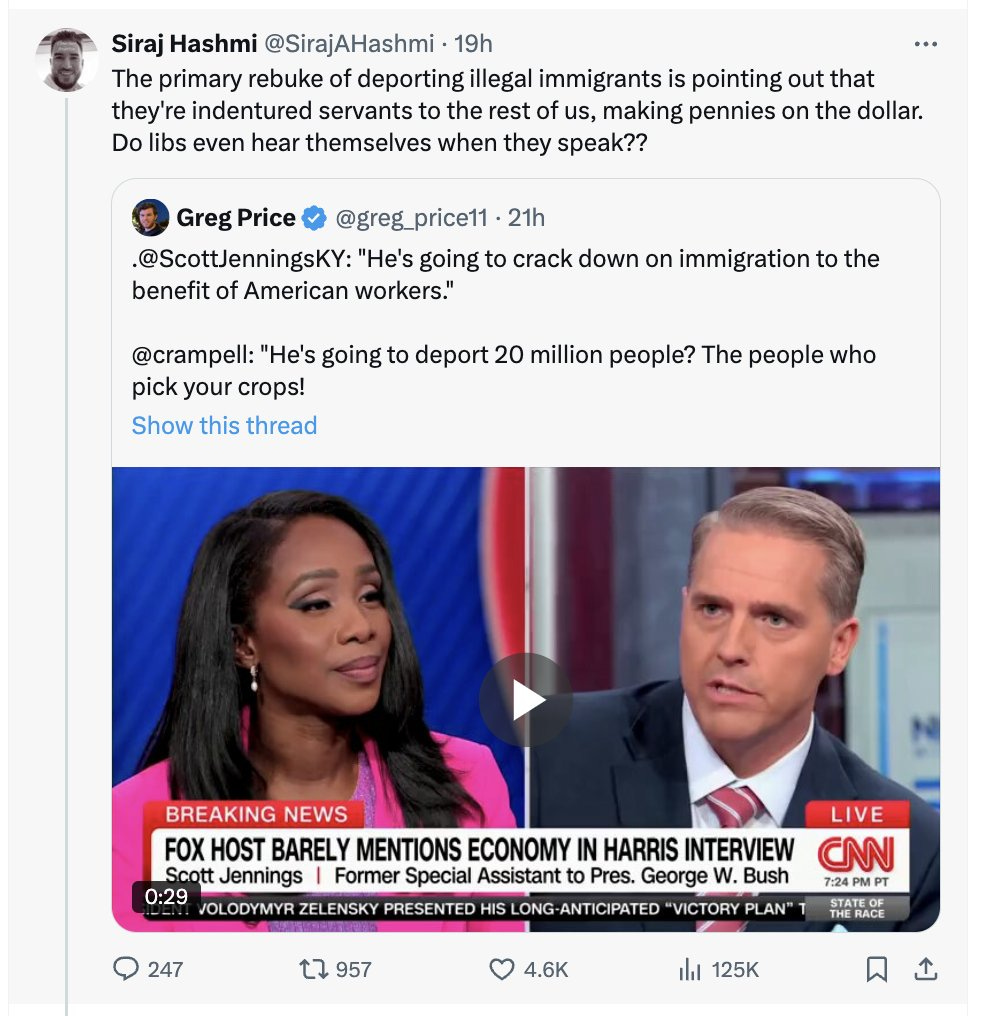Something That Grinds My Gears
The Republican talking point about how “Democrats love illegal immigration because businesses get cheap labor that they can exploit” annoys me greatly. It’s a simple attack that works on two fronts:
It saddles Democrats with being a party of lawlessness, and open borders
It serves the populist right’s narrative about American workers being replaced by immigrants
This all stems from a recent discussion on CNN’s “NewsNight with Abby Phillip.” Panelist Kevin O’Leary, of Shark Tank fame, was arguing in favor of Donald Trump’s proposed tariffs on goods imported from China. Washington Post opinion columnist Catherine Rampell was having none of it, pushing back strongly against O’Leary’s arguments. Unfortunately, O’Leary is not interested in listening, or having a conversation, because he just continues to interrupt and talk over Rampell.
Anyway, for those who dont know, here is a very quick explanation of what a tariff actually is. The Harvard Business Review has an excellent article that reviews 250 years worth of economic theory regarding tariffs. I’m going to use their definition of a tariff, for simplicity’s sake:
“Tariffs are taxes imposed by a country that make imports more expensive. The U.S. enacted this recent round of tariffs as a response to its trade deficit (when a country buys more from abroad than it sells). The idea is to make foreign products less desirable and thus protect domestic industry.”
Trump imposed tariffs during his first term, but perhaps none were as costly as his 25% tariff on imported steel. This tariff applied to all imported steel, regardless of its origin. Trump’s big brained theory was that this would boost the American steel industry. As it turns out, it was a disaster for any American business that relied on steel. Let’s break down exactly what happened following the tariff’s implementation.
Steel prices ended the year 14% lower than they were when Trump implemented the tariff
Steel-mill employment grew at half the rate of the rest of the private sector
Stock prices of US steel firms dropped by 20% while the S&P lost 5%
An estimated 4 million Americans work jobs that require steel to manufacture products. To be competitive globally, these firms need to have access to reasonably priced steel, so that they can make things like airplanes, cars, machinery and prefab metals, at prices that will be competitive. When the price of steel goes up, these firms have to raise their prices to compensate.
From Tariffs to Deporting Illegals
Going back to the CNN segment with O’Leary and Rampell, Republican communications guy Scott Jennings (a Trump supporter), commented that Trump will “crack down on immigration to the benefit of American workers.” Rampell shot back, saying, “He’s going to deport 20 million people? The people who pick your crops!”
This portion of the CNN segment made its way onto Twitter/X by way of Greg Price, who is a MAGA enthusiast and conspiracy theorist. He is extremely popular among Republicans these days. Enter Siraj Hashmi, another popular right wing commentator who believes, among other conspiracies, that the 2020 election was stolen from Trump. In fact, his wife, Emily Newman, was part of Sidney Powell’s legal team that attempted to overturn the election results in Georgia.
Siraj does the snarky tweeting very well, I will admit. But this line of argumentation drives me nuts. Rampell’s blunt response to Jennings’ point about the crackdown on immigration is absolutely correct. Folks like Siraj are acting in bad faith here, and I suspect they know this. When Rampell mentions “the people who pick your crops” - she is not saying this in a derogatory manner, or implying that people who do these jobs are just peasants. And it should go without saying that she is obviously not referring to those workers as slaves. Again, this is where people like Siraj annoy me, because they just sensationalize everything to get a laugh.
Rampell is pointing out, rightly, that there are a plethora of jobs that exist in our society that are far from desirable. Take your pick among many. Whether it’s something like tending to crops under the blistering sun, or climbing ladders and scaffolding to paint homes and business, or assembling small products that require human hands instead of automated machinery, there are all sorts of jobs that the majority of Americans do not want.
A recent example of this can be found in Springfield, Ohio.
Thousands of new jobs had been created there, thanks to a successful effort by the city’s leadership and Chamber of Commerce to attract new business to Springfield, which sits between Columbus and Dayton. Once a manufacturing hub, Springfield saw its economy shrink after factories closed and jobs migrated overseas. By about 2015, its population had dwindled to under 60,000, from about 80,000 in the late 1960s and early 1970s.
Companies that set up shop, however, confronted a dire labor shortage.
Haitians in Florida, Haiti and South America heard from friends and family about Springfield and its need for workers. They began arriving to take jobs in warehouses, manufacturing and the service sector, and employers urged the new workers to encourage other Haitians to join them.
Springfield represents the American dream, despite what Donald Trump and JD Vance would tell you. But don’t take it from me! Take it from the folks who live there, who recognize that Haitian migrants have injected new life into this community.
The CEO of a Springfield business, called Pentaflex, remarked:
“There are challenges, particularly with the language barriers. But they come to work every day, they work hard, they want all the work they can get,” he said. “From an employer standpoint, they’ve made a positive impact.”
Why did those businesses in Springfield need workers? Surely the native born citizens living in the area could have taken those jobs? And this is what brings us back to the part about undesirable jobs. Many of the jobs that Haitian migrants have taken, in Springfield, are manufacturing jobs that require some amount of manual labor. They’re not being hired to code, or do financial analysis, or some other desk job that requires a graduate degree. They’re being hired to do hard work, and they’re rewarding their employers by being reliable employees. This comes with many challenges, especially the language barrier and the increased demand for housing, but the long term benefits far outweigh those costs.
Closing Thoughts
Maybe Rampell could have picked a less abrasive example, instead of “picking crops”, she could have talked about home health aids, or nursing home employees, or even janitors and maintenance workers. Remember the bridge collapse in Baltimore from earlier this year? The Francis Scott Key bridge collapsed when a ship veered off course and slammed into it. Tragically, 6 construction workers died in the accident. They were immigrants from Guatemala, El Salvador, Honduras, and Mexico. These were hardworking folks, who were doing brutally difficult and dangerous work, repairing bridges and other structures. Despite not earning a lot of money, these people would send money back home to their families, living outside the United States.
The workers who died in the bridge collapse were not native born Americans. They were people desperately looking for any opportunity to earn a living, regardless of how dangerous the job would prove to be. And the fact of the matter is, someone has to be willing to repair our infrastructure. And that is what is at the heart of Rampell’s argument. If the right wing populist trolls like Siraj can show me thousands of native born Americans who are willing to work these types of jobs, then I would be open to more restrictions on immigration. But until then, I will continue to believe that immigration, even illegal immigration, is vital to the strength of the American economy.




